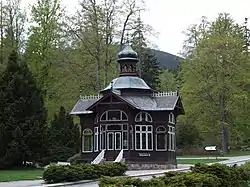Karlova Studánka
Karlova Studánka (German: Bad Karlsbrunn) is a spa village in Bruntál District, Moravian-Silesian Region, Czech Republic. It has a population of around 160.
Karlova Studánka | |
|---|---|
Village | |
 Spa Pavilion | |
 Flag  Coat of arms | |
 Karlova Studánka Location in the Czech Republic | |
| Coordinates: 50°4′27″N 17°18′10″E | |
| Country | |
| Region | Moravian-Silesian Region |
| District | Bruntál District |
| Area | |
| • Total | 1.6 km2 (0.6 sq mi) |
| Elevation | 775 m (2,543 ft) |
| Population (2020)[1] | |
| • Total | 165 |
| • Density | 100/km2 (270/sq mi) |
| Time zone | UTC+1 (CET) |
| • Summer (DST) | UTC+2 (CEST) |
| Postal code | 793 24 |
| Website | http://www.kstudanka.cz/ |
The first time the village was ever mentioned in written sources was in 1554, albeit under a different name. It was renamed to “Karlova studánka” in 1803 in honour of Archduke Charles Ludwig, who defeated Napoleon in the Battle of Aspern-Essling.[2]
Karlova Studánka lies in the valley of the mountain river Opava and is part of the Praděd nature reserve. Nowadays, it is obe of the places in the region with the cleanest air. All local springs have a high proportion of carbon dioxide through peat bogs. It is possible to taste and draw water from the healing springs, in the Drinking Pavilion (Pitný pavilon) where the Wilhelm spring is located, or in the house of Libuše.
The town also offers ideal hiking conditions, besides being the starting point of one of the most attractive natural areas with plenty of hiking trails like the route called Bilá Opava Waterfalls (Vodopády Bílé Opavy). Bilá Opava river rises on the southern slope of Mt. Praděd at an altitude of 1260 m above sea level. The larger waterfall is almost 8 m-high and the trail is accessed by wooden bridges and stairways.
Thanks to its favourable climate and location in the picturesque countryside, the spa serves as a specialized sanatorium providing treatment to patients suffering from diseases of respiratory organs, in the treatment of which the unique pure mountain climate proves to be beneficial. The spa buildings from the beginning of the 19th century are also architectonically interesting.
References
- "Population of municipalities of the Czech Republic". Czech Statistical Office. 1 January 2020.
- "Tips for Trips: Jeseníky | Foreigners.cz Blog". blog.foreigners.cz. 2020-08-13. Retrieved 2020-10-16.